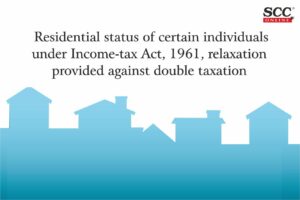The Ministry of Finance has issued a Circular[1] dated 03.03.2021 providing relaxation to certain individuals with respect to their residential status under Income Tax Act, 1961 (the Act) for the previous year, due to Covid-19.
The provisions for determination of residency of a person are stated in Section 6 of the Act. The status of an individual, as to whether he is a resident in India or a non-resident or not ordinarily resident, is dependent on the period for which the person is in India during a previous year or years preceding the previous year.
Relaxation for Previous Year 2019-2020
The Central Board of Direct Taxes had issued a Circular[2] on 8th May, 2020 clarifying the purpose of determining the residential status under Section 6 of the Act during the Previous Year 2019-2020 with respect to an individual who had come to India on a visit prior to March 22, 2020 and had to overstay in India due to the pandemic. Such period until 31st march, 2021 shall not be taken into account under S.6 of the Act.
Residential Status of Previous Year 2020-21
The computation is undertaken through number of days and income of the individuals.
- Short Stay will not result in Indian Residency
An Individual who is not citizen of India or a person of Indian origin may become resident in India only in one of the following situations: if he stays during PY 2020-21 for 182 days or more; or if he stays during the PY 2020-21 for 60 days or more and also stays for 365 days or more in preceding four previous years.
- Issue of Dual Residency
Applying the Rule of 182 days in India, a person may become resident in India even if he stays in India for less than 182 days. In such situation, a person may not become a tax resident in any country in PY 2020-21 even after staying for more than 182 days or more in India as it would result in double non-taxation and the person might end up not paying tax in any country.
- Tie breaker Rules as per Double Taxation Avoidance Agreement (DTAA)
The Double Taxation Avoidance Agreement, if applied such person will become the resident of only one country as per the rule of Tie-Breaker in the DTAA. The Indo-US DTAA provides a resolution mechanism through Mutual Agreement Procedure in the following cases where a person becomes the resident of two countries:
- Permanent home available in the two countries
- Centre of vital interest cannot be determined
- Has habitual abode in both states or in neither of them
- He is a national of both states or neither of them
- Employment Income Taxable subject to conditions of DTAA
The DTAA distributes the taxation rights between the employee’s jurisdiction of residence and the place where the employment is exercised. Salaries, wages and other similar remuneration is taxable only in the country in which the employee is resident unless the employment is exercised in the other country. For eg. a USA resident under employment of a USA corporation has got stranded in India and performs employment from India, its salary will not be taxable in India unless he is present in India for 183 days or more during the PY 2020-21 or if the salary is borne by Indian permanent establishment of such USA corporation.
- Credit for the taxes paid in other country
As per the circular, a resident person in India shall be entitled to claim credit of the taxes paid in any other country in accordance with the rule 128 of the Income-tax Rules, 1962.
Conclusion
According to the Circular, the possibility of double taxation does not exist as per the provisions of the Income-tax Act, 1961 read with the DTAAs. However, in situations where the individual is facing double taxation even after taking into consideration the relief provided by the respective DTAAs, he may furnish the information in Form -NR annexed to the Circular by 31st March, 2021.
*Tanvi Singh, Editorial Assistant has put this story together.
[1] Circular No. 2 of 2021 dated 03.03.2021, Central Board of Direct Taxes, Ministry of Finance (Dept. of Revenue)
[2] Circular No. 11 of 2020 dated 08.05.2020, Central Board of Direct Taxes, Ministry of Finance (Dept. of Revenue)

